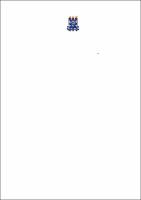| Compartilhamento |


|
Use este identificador para citar ou linkar para este item:
http://tede2.uefs.br:8080/handle/tede/676| Tipo do documento: | Dissertação |
| Título: | A construção discursiva do trabalho feminino em revistas: uma comparação entre Jornal das Moças e Claudia |
| Autor: | Azevêdo, Jeany Santos De Carvalho  |
| Primeiro orientador: | Alvarez, Palmira Virgínia Bahia Heine |
| Resumo: | O presente trabalho constitui-se em um estudo sobre a construção discursiva do trabalho feminino a partir de textos escritos e imagéticos publicados nas revistas Jornal das Moças (anos 50 do séc. XX) e Claudia (dos anos 2010 a 2015 do séc. XXI). As revistas femininas tratam de assuntos ditos importantes para esse público em suas determinadas condições de produção. Esse tema é relevante devido à necessidade de observarmos como ocorre a construção do discurso sobre a mulher e sobre o trabalho e de compreendermos por que alguns discursos são reproduzidos/silenciados atualmente sobre o espaço que a mulher pode/deve ocupar na sociedade, principalmente no que diz respeito ao trabalho fora de casa. O escopo teórico desta pesquisa está centrado na Análise de Discurso Pecheutiana, tendo como base os estudos de Orlandi (2007; 2015) e Pêcheux (1993; 2006). Assim, alguns pressupostos básicos dessa teoria são importantes para este estudo, tais como: as formações imaginárias, discursivas e ideológicas que norteiam os dizeres sobre as mulheres nessas revistas e os já-ditos sobre elas que compõem o interdiscurso. Com base no corpus selecionado das revistas Jornal das Moças e Claudia, observamos as sequências discursivas e imagéticas que relacionam mulher e trabalho e aplicamos o aparato teórico-metodológico da Análise de Discurso pecheutiana a esses dados. Importa destacar que os resultados mostram que há uma diferença na construção da imagem da mulher nessas duas revistas. Enquanto as publicações da década de 50 discursivizam a mulher no lar e em algumas profissões que representam uma extensão do trabalho doméstico, a revista Claudia modifica um pouco o viés mostrando a mulher em várias profissões, mas ainda enfrentando a luta pela igualdade salarial e pelo respeito e valorização quando ocupam posições de liderança nas empresas. Porém vale ressaltar que, mesmo discursivizando a mulher nos vários espaços, a revista, no material analisado, ainda dá mais ênfase ao papel de mãe, esposa e dona de casa, mostrando que os já-ditos sobre a mulher nas mais remotas épocas ainda ressoam nos discursos hodiernos, indicando que há uma tensão entre o trabalho e a maternidade. |
| Abstract: | The present research constitutes a study about the discursive construction of feminine work based on written and imagetic texts published in Jornal das Moças (fifties of the twentieth century) and Claudia (from 2010 to 2015 of the twenty-first century) magazines. These magazines for women talk about subjects considered important to this public in their determined conditions of production. This theme is relevant because of the necessity of observing how it is constructed the discourse about women and work as well as it provides the opportunity to comprehend the reason why some discourses about the position women can/have to occupy in the society are reproduced/silenced nowadays, mainly concerning outdoor work. The theoretical scope of the research is centered on Pêcheux’s Discourse Analyses, specially the studies of Orlandi (2007, 2015) and Pêcheux (1993, 2006). Thus, some basic assumptions of this theory are relevant to this study, such as: imaginary, discursive and ideological formations, which guide what it is said about women in the magazines analyzed, as well as the already-said about women that composes the interdiscourse. Based on the corpus selected from Jornal das Moças and Claudia magazines, it was observed the discursive sequences and imagetic which relate women and work, applying the theoretic-methodological apparatus of Pêcheux’s Discourse Analysis to this data. It is important to highlight that the results show that there is a difference on the construction of women in the magazines. While the publications from the fifties discursed women at home and in some professions which were in extension of the housework, Claudia magazine modifies the bias showing women in many professions, but still struggling for salary equality and for respect and appreciation when they occupy leadership positions in the companies. Although it is important to highlight that even when discursing the woman in different positions, the magazine, in the analyzed material, still give more emphasis to mother, wife and housewife positions, showing that the already-said about women from the most remote periods still resound in nowadays discourses, indicating that there is a tension between work and maternity. |
| Palavras-chave: | Análise de Discurso Mulher Trabalho Revistas Discourse Analyses Woman Work Magazines |
| Área(s) do CNPq: | LINGUISTICA::LINGUISTICA APLICADA |
| Idioma: | por |
| País: | Brasil |
| Instituição: | Universidade Estadual de Feira de Santana |
| Sigla da instituição: | UEFS |
| Departamento: | DEPARTAMENTO DE LETRAS E ARTES |
| Programa: | Mestrado Acadêmico em Estudos Linguísticos |
| Citação: | AZEVÊDO, Jeany Santos De Carvalho. A construção discursiva do trabalho feminino em revistas: uma comparação entre Jornal das Moças e Claudia. 2018. 153 f. Dissertação (Mestrado Acadêmico em Estudos Linguísticos) - Universidade Estadual de Feira de Santana, Feira de Santana, 2018. |
| Tipo de acesso: | Acesso Aberto |
| URI: | http://tede2.uefs.br:8080/handle/tede/676 |
| Data de defesa: | 8-Mar-2018 |
| Aparece nas coleções: | Coleção UEFS |
Arquivos associados a este item:
| Arquivo | Descrição | Tamanho | Formato | |
|---|---|---|---|---|
| Azevêdo, Jeany_Dissertação_2018.pdf | Arquivo de texto completo | 10,6 MB | Adobe PDF |  Baixar/Abrir Pré-Visualizar |
Os itens no repositório estão protegidos por copyright, com todos os direitos reservados, salvo quando é indicado o contrário.




